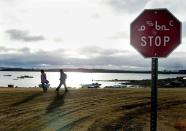AFP
June 16, 2010
http://www.google.com/hostednews/afp/article/ALeqM5h_4nhYrje1XBXjgY_MFwBREx31Kg
 |
| Inuit children returning from school in Iqaluit, northern Canada |
OTTAWA — Hundreds of Canadian aboriginals gathered on Wednesday for a truth and reconciliation commission to recall two centuries of abuse at boarding schools set up to assimilate indigenous peoples.
The four-day event in Winnipeg, Manitoba was the first of seven to be held across Canada within five years, as part of a settlement reached with 80,000 former students in 2006.
Former students, aboriginal leaders, church groups and the general public showed up for the hearings.
"We can all learn from the lessons of the past, and walk toward respectful relations for the future," commission chair Marie Wilson said in a statement.
Beginning in 1874, 150,000 Indian, Inuit and Metis children in Canada were forcibly enrolled in the 132 boarding schools run by Christian churches on behalf of the federal government in an effort to integrate them into society.
Many survivors alleged abuse by headmasters and teachers, who stripped them of their culture and language.
As well, they say their education left them disconnected from their families, communities and feeling "ashamed" of being born native.
It was "the darkest chapter in Canada's history," said Chief Phil Fontaine of the Assembly of First Nations.
"They tried to kill the Indian in the child, to eradicate any sense of Indian-ness from Canada," he told AFP in 2008 when Prime Minister Stephen Harper officially apologized to natives for more than a century of abuses at the boarding schools.
There are some 1.3 million aboriginals in Canada, out of a total population of 33 million.
Most of Canada's Indian Residential Schools, modeled after US Indian industrial schools of the period, were shut down in the 1970s. The last one closed in 1996 in Saskatchewan province.
The commission plans to hear testimony from thousands of survivors and officials, as well as gather and review millions of government and church documents to be made public for the first time.
"It's one of many gestures that illustrate our desire as a government and a nation to foster a spirit of reconciliation between aboriginal peoples and all Canadians," said Indian Affairs Minister Chuck Strahl.
Any original material on these pages is copyright © BishopAccountability.org 2004. Reproduce freely with attribution.